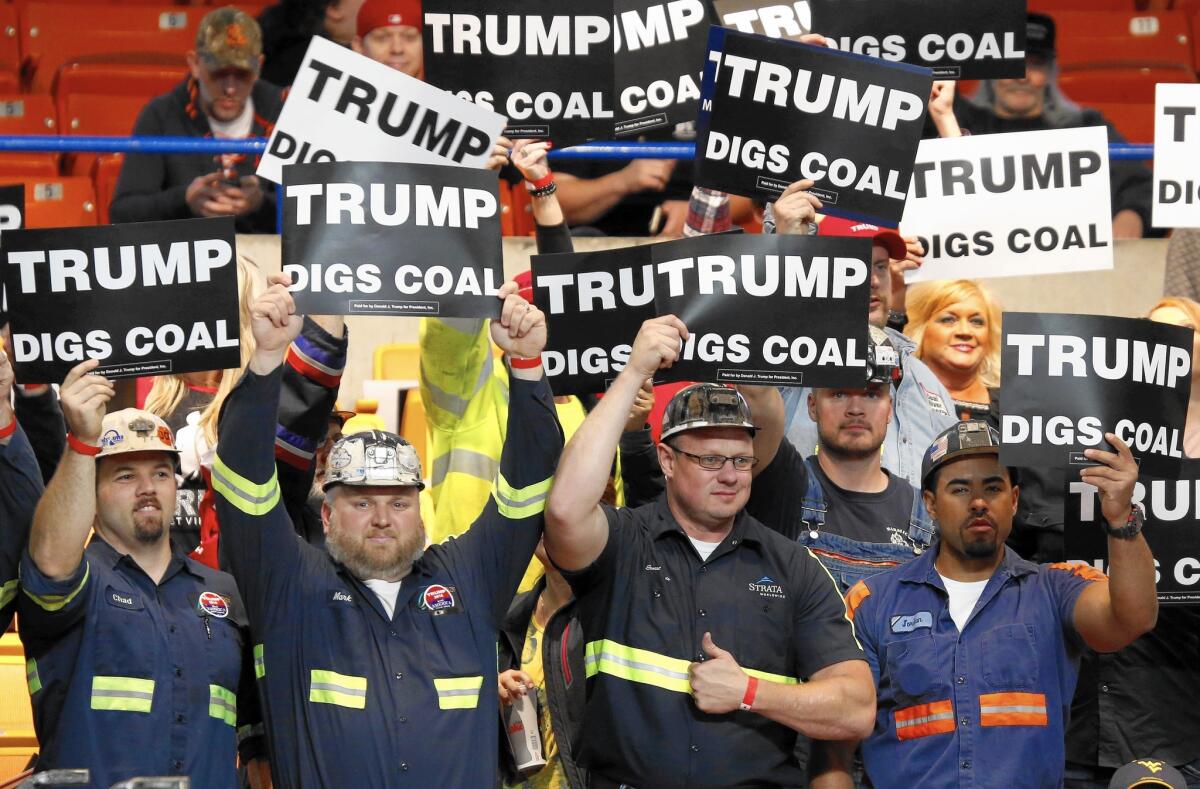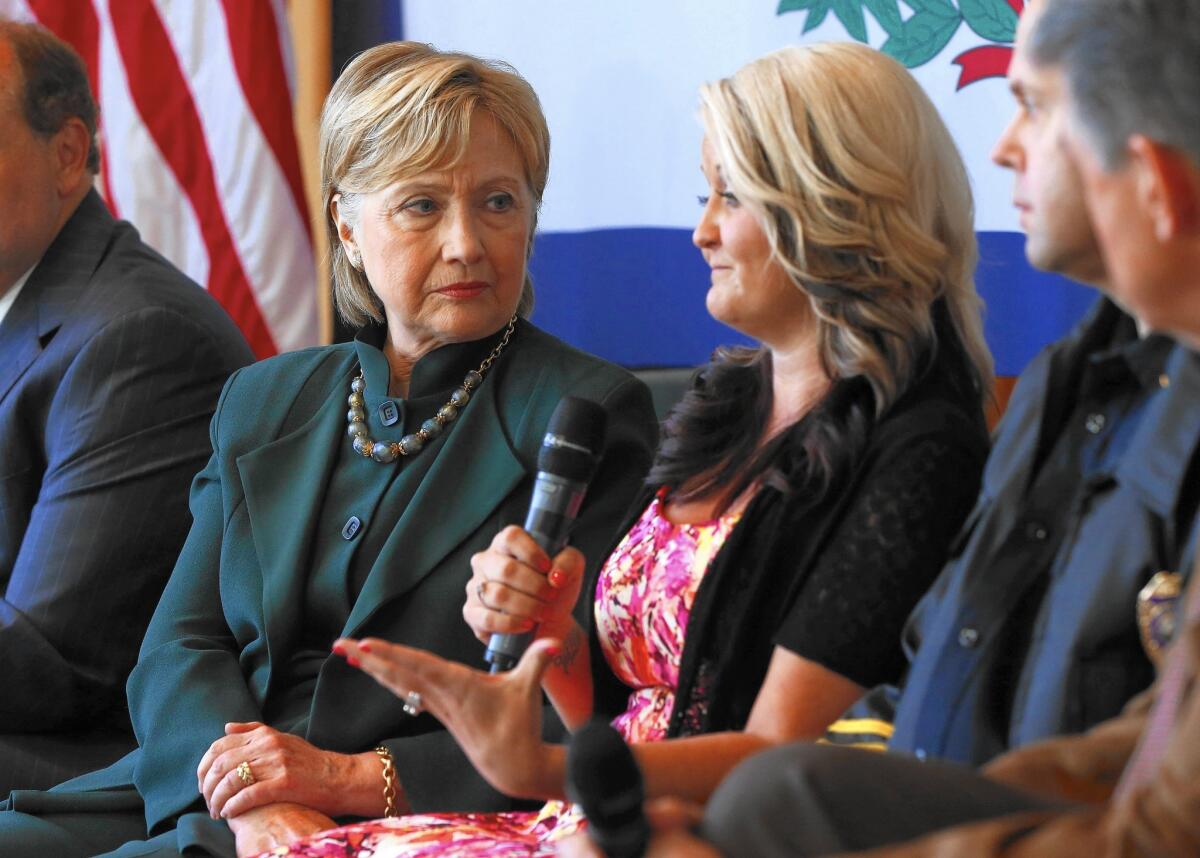Clash between Trump and Clinton over coal foreshadows a tough fight for her in battleground states

Voters in Appalachian coal country will not soon forget that Democrat Hillary Clinton told an Ohio audience in March that she would “put a lot of coal miners and coal companies out of business.”
“It was a devastating thing for her to say,” said Betty Dolin, whose diner in this mountain hamlet offers daily testament to the ravages that mining’s demise has visited upon families whose livelihood depends on coal.
Mine closures, bankruptcies and layoffs are staples of lunchtime conversation for those who have not fled town in search of work. Like many fellow Democrats in the region, Dolin, 73, favors Republican Donald Trump for president, however rude he might seem to the proprietor of a no-frills restaurant known for its graham cracker pie.
“I’m going to go for the person who wants coal,” she said.
With a Trump-Clinton contest in November now all but certain, the importance of West Virginia’s primaries Tuesday has diminished. But the clash over coal, climate change and jobs as the campaign passed through Appalachia foreshadows potential trouble ahead for Clinton.
Although West Virginia is solidly Republican for the general election, the adjacent battleground states of Ohio, Virginia and Pennsylvania include Appalachian regions where the mining jobs that Trump vows to save are the linchpin of local economies.

Clinton’s bungled remarks on coal’s grim future — “I misspoke,” she conceded last week — opened the way for Trump to strengthen his bonds with the voters she offended.
“That’s a tough one to explain, wouldn’t you say?” Trump asked cheering supporters Thursday at a rally in Charleston, W.Va.
Trump has played to public anger over efforts by President Obama, Clinton and other Democrats to scale back the burning of coal and other fossil fuels that contribute to global warming.
David Myers, an out-of-work miner, echoed the profanity Trump has repeatedly used on Twitter to repudiate global warming. Like Trump, Myers and others in coal country say misguided plans to stop it are costing jobs.
“A man of my caliber should be able to get a job in a blink of an eye, but there’s no jobs to be had,” said Myers, 49, who wore miner coveralls to Trump’s rally.
Trump has dismissed global warming as a “canard,” “hoax” and “total con job,” citing cold weather snaps as evidence.
On the day of Obama’s 2012 reelection, Trump tweeted: “The concept of global warming was created by and for the Chinese in order to make U.S. manufacturing non-competitive.” In September, he told CNN, “I don’t believe in climate change.”
Clinton is trying to turn such statements against him. “When he says climate change is a Chinese hoax, what does that mean?” she said Friday on CBS. “Has he ever talked to a scientist, or is he just again assuming a slogan?”
Trump could pay a price for his rejection of climate change science. Ohio, Virginia and Pennsylvania all include big metropolitan areas where Clinton’s plans to fight global warming resonate with many moderates. Trump has positioned himself as “anti-science and anti-intellectual,” said Mark Mellman, a Democratic pollster unaffiliated with the Clinton campaign.
“There’s no question in my mind that Trump loses something important with a very large constituency with his climate change position,” he said.
A recent Pew Research Center study found 77% of Democrats viewed climate change as a major threat to the U.S., but only 26% of Republicans saw it that way.
Clinton’s stumble came March 13 in a CNN town hall in Columbus, Ohio. She was answering a question on why poor Southern whites who vote Republican should instead back her.
“I’m the only candidate which has a policy about how to bring economic opportunity using clean, renewable energy as the key into coal country, because we’re going to put a lot of coal miners and coal companies out of business,” she said.
The damage was done, even if she quickly added, “We’re going to make it clear that we don’t want to forget those people.”
Protesters have booed and heckled Clinton and her husband on their visits to West Virginia. It’s a hard fall from 2008, when Hillary Clinton clobbered Obama in the state’s Democratic primary. In 1992 and 1996, Bill Clinton won the state in a rout.
Economists doubt any president can stop coal’s decline. In Appalachia, coal production has dropped 45% over the last decade, according to the Appalachian Regional Commission. The rising use of natural gas and renewable energy has come at coal’s expense. Exports are down too.
Since 2011, more than a third of the region’s mining jobs have vanished, a devastating loss in towns wholly dependent on coal for survival. Lost tax revenue has forced schools to shut down or lay off teachers, 77 of them here in Boone County.
“It affects everything,” Sue Doss, the payroll director for county schools, said at lunch Saturday at Dolin’s diner, where Bill Clinton paid a surprise visit days earlier.
At stops last week in West Virginia, Ohio and Kentucky, which holds a Democratic primary on May 17, Hillary Clinton touted her $30-billion plan for job training, road and bridge projects, broadband expansion and other help for coal country.
In Athens, Ohio, she warned that trends against mining would not reverse, “no matter what some politicians tell you” — a dig at Trump’s jocular rhetoric about coal’s revival once he’s president.
“We know we need to protect our children’s health and futures by combating climate change and accelerating the transition to a clean-energy economy,” she said.
At her roundtable in Williamson, W.Va., laid-off coal miner Bo Copley teared up as he passed Clinton a photo of his children to show her who was harmed by coal’s downfall.
Clinton responded, “I do feel a little bit sad and sorry that I gave folks the reason or the excuse to be so upset with me, because that is not what I intended at all.”
A few days later, Copley attended Trump’s Charleston rally, where he wept again when the 13,000 people packed into the sports arena applauded him for confronting Clinton.
Copley’s story moved some residents of Danville, a town of fewer than 700 people wedged into a lush ravine where rail cars transport the coal from local mines. In a conversation outside her home overlooking the tracks, attorney Cecilia Jarrell, 57, said Copley had captured the wrenching reality of an industry’s death.
“It’s very emotional, and it’s very scary,” said Jarrell, a Democrat who voted for Obama, but is leaning toward Trump because of Clinton’s comments on coal.
Jarrell’s neighbor, Mazie Dalton, 65, cooks the pies at Dolin’s diner. She too was put off by Clinton’s remarks and unmoved by her apologies.
“Hillary plainly stated it: She don’t want coal,” Dalton said. “She’s going to bankrupt it.”
Twitter: @finneganLAT
------------
FOR THE RECORD
May 11, 11:45 a.m.: An earlier version of this article misspelled diner owner Betty Dolin’s last name as Dolan.
------------
See more of our top stories on Facebook >>
ALSO
‘Dump Trump’ shirts initially banned by O.C. high school, later OK’d
Seeking justice for nephew, Rep. Judy Chu aims to stop military hazing
More to Read
Get the L.A. Times Politics newsletter
Deeply reported insights into legislation, politics and policy from Sacramento, Washington and beyond. In your inbox three times per week.
You may occasionally receive promotional content from the Los Angeles Times.







